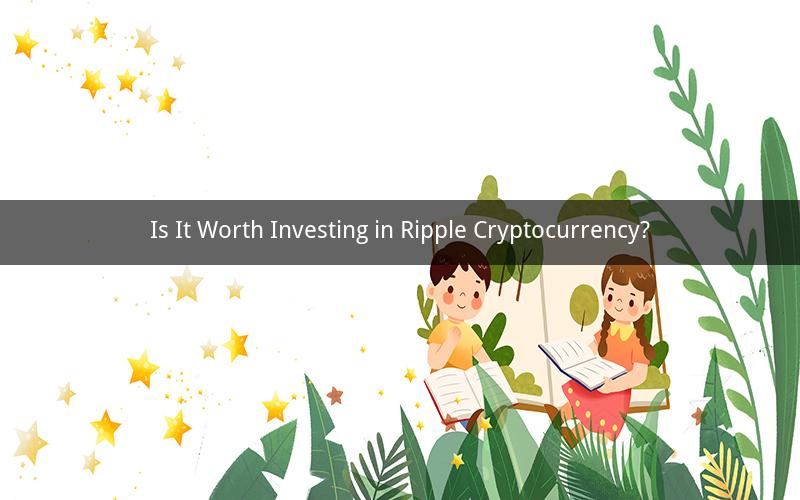
In recent years, the cryptocurrency market has experienced significant growth, attracting the attention of both investors and enthusiasts. Among the numerous cryptocurrencies available, Ripple (XRP) has emerged as a notable player. This article delves into the factors that make Ripple an attractive investment option, its potential risks, and its long-term prospects.
1. Understanding Ripple and Its Unique Features
Ripple is a decentralized digital currency designed to facilitate instant, low-cost international financial transactions. Unlike Bitcoin, which focuses on being a store of value, Ripple's primary goal is to improve the efficiency of cross-border payments. Its unique features include:
- Instant Transactions: Ripple's blockchain technology enables near-instantaneous transactions, significantly reducing processing times and fees compared to traditional banking systems.
- Low Transaction Costs: Ripple offers some of the lowest transaction costs in the cryptocurrency market, making it an attractive option for businesses and individuals alike.
- High Scalability: Ripple's network can handle a high volume of transactions per second, ensuring that it can accommodate the growing demand for cross-border payments.
2. The Advantages of Investing in Ripple
Investing in Ripple can offer several advantages:
- Market Potential: As global trade continues to expand, the demand for faster, more cost-effective cross-border payments is on the rise. Ripple's unique features make it well-positioned to capture a significant portion of this market.
- Strong Partnerships: Ripple has formed partnerships with numerous financial institutions, including banks and payment processors. These partnerships can help drive adoption and increase the currency's value.
- Regulatory Compliance: Ripple has taken steps to ensure compliance with financial regulations, which can help mitigate regulatory risks associated with investing in cryptocurrencies.
3. Risks of Investing in Ripple
Despite its advantages, investing in Ripple carries certain risks:
- Market Volatility: The cryptocurrency market is known for its volatility, and Ripple is no exception. Its value can fluctuate widely, which can result in significant gains or losses for investors.
- Regulatory Uncertainty: While Ripple has taken steps to ensure regulatory compliance, the cryptocurrency market remains subject to evolving regulations, which can impact the currency's value.
- Competition: Ripple faces competition from other cryptocurrencies and traditional payment systems. This competition could hinder its growth and impact its value.
4. Long-Term Prospects for Ripple
The long-term prospects for Ripple are promising:
- Global Adoption: As more businesses and individuals seek faster, more cost-effective cross-border payment solutions, Ripple's market potential is expected to grow.
- Technological Advancements: Ripple's technology is continually evolving, with ongoing improvements aimed at enhancing its efficiency and security.
- Industry Recognition: Ripple has received recognition from various industry experts and financial institutions, which can contribute to its growth and adoption.
In conclusion, investing in Ripple cryptocurrency can be a viable option for those looking to diversify their portfolios. Its unique features, strong partnerships, and promising long-term prospects make it an attractive investment choice. However, it's crucial to consider the risks associated with investing in cryptocurrencies and conduct thorough research before making any investment decisions.
Questions and Answers:
1. What sets Ripple apart from other cryptocurrencies?
Answer: Ripple stands out due to its focus on improving the efficiency of cross-border payments, offering instant transactions, low costs, and high scalability.
2. Can Ripple's growth be attributed to its partnerships with financial institutions?
Answer: Yes, Ripple's partnerships with banks and payment processors have played a significant role in its growth and adoption.
3. What are the potential risks of investing in Ripple?
Answer: The main risks include market volatility, regulatory uncertainty, and competition from other cryptocurrencies and traditional payment systems.
4. How does Ripple's technology contribute to its potential for growth?
Answer: Ripple's technology enables near-instantaneous transactions, low costs, and high scalability, making it an attractive option for businesses and individuals seeking faster, more cost-effective cross-border payment solutions.
5. Should investors prioritize Ripple over other cryptocurrencies?
Answer: It's essential for investors to conduct thorough research and consider their individual investment goals, risk tolerance, and diversification strategy before prioritizing Ripple over other cryptocurrencies.